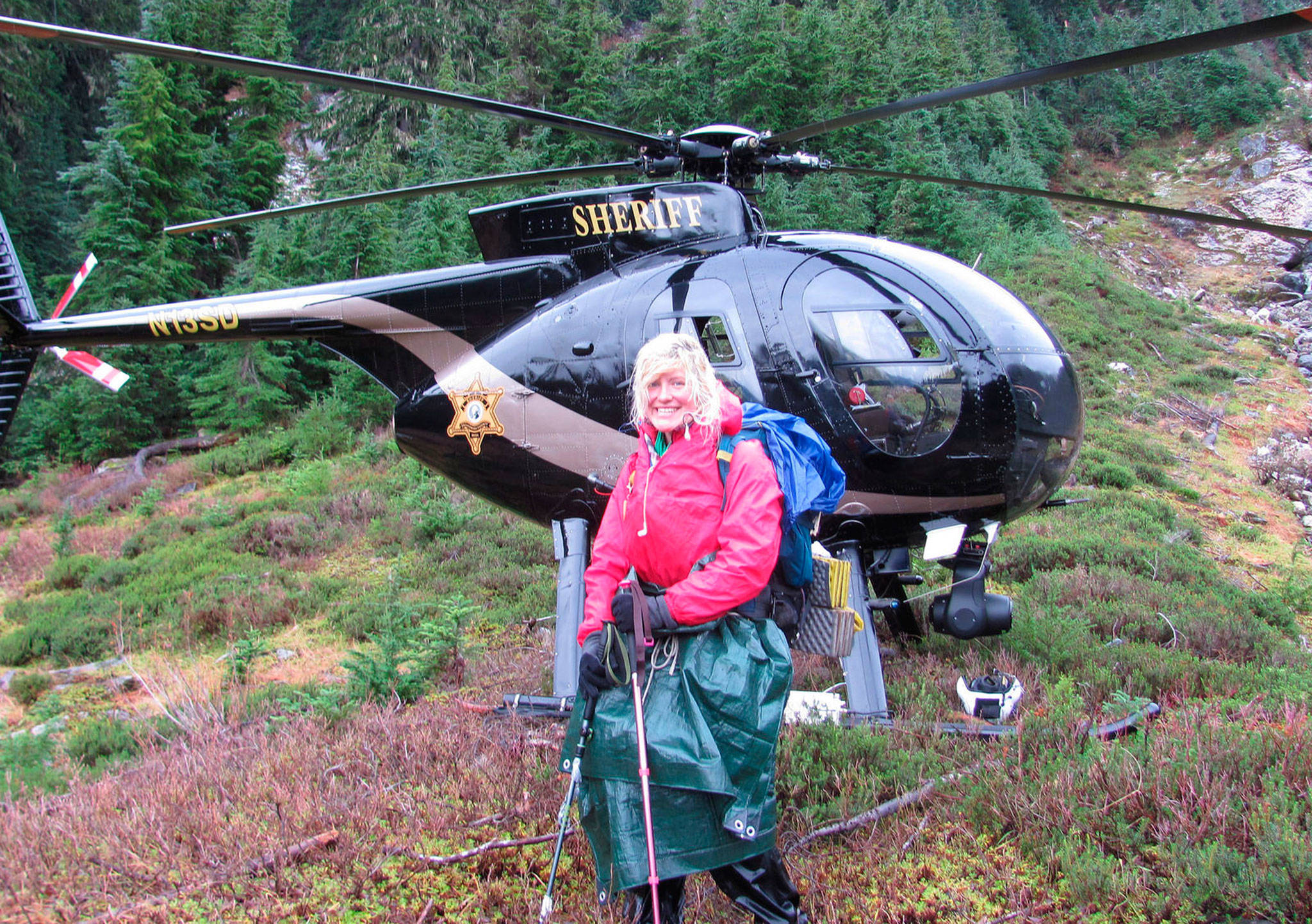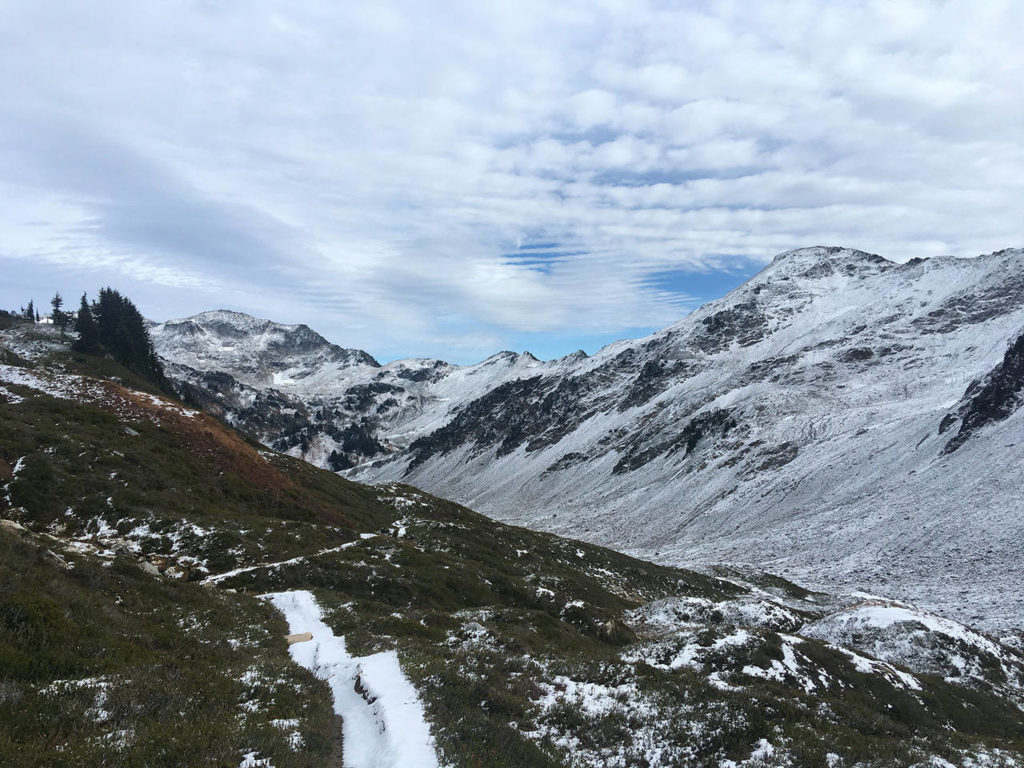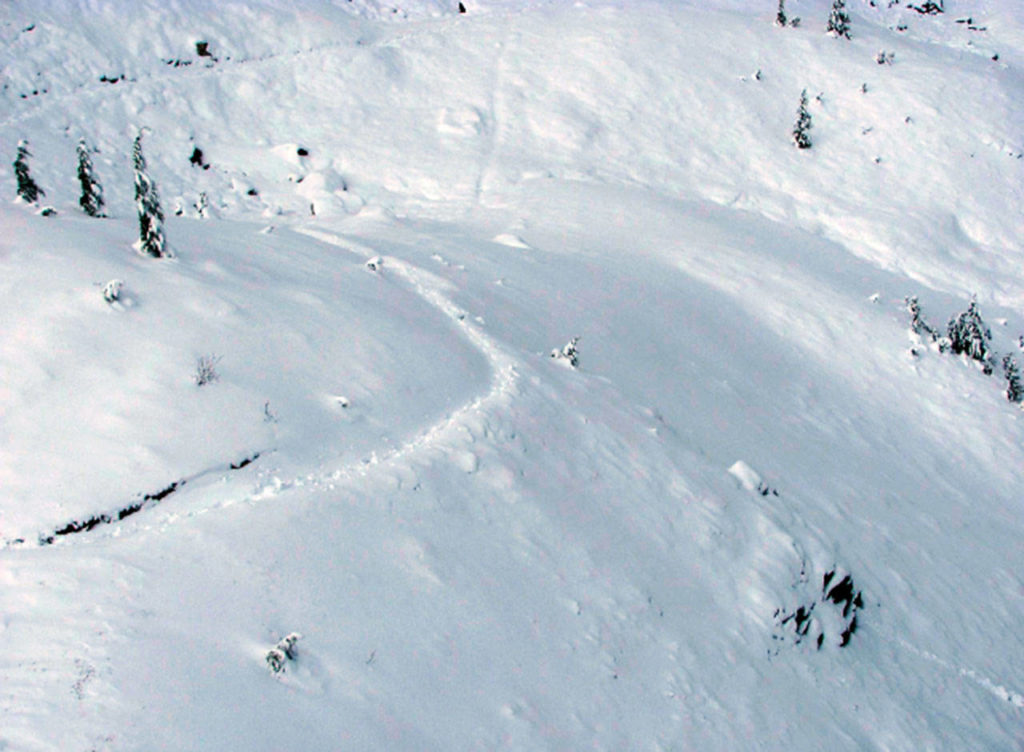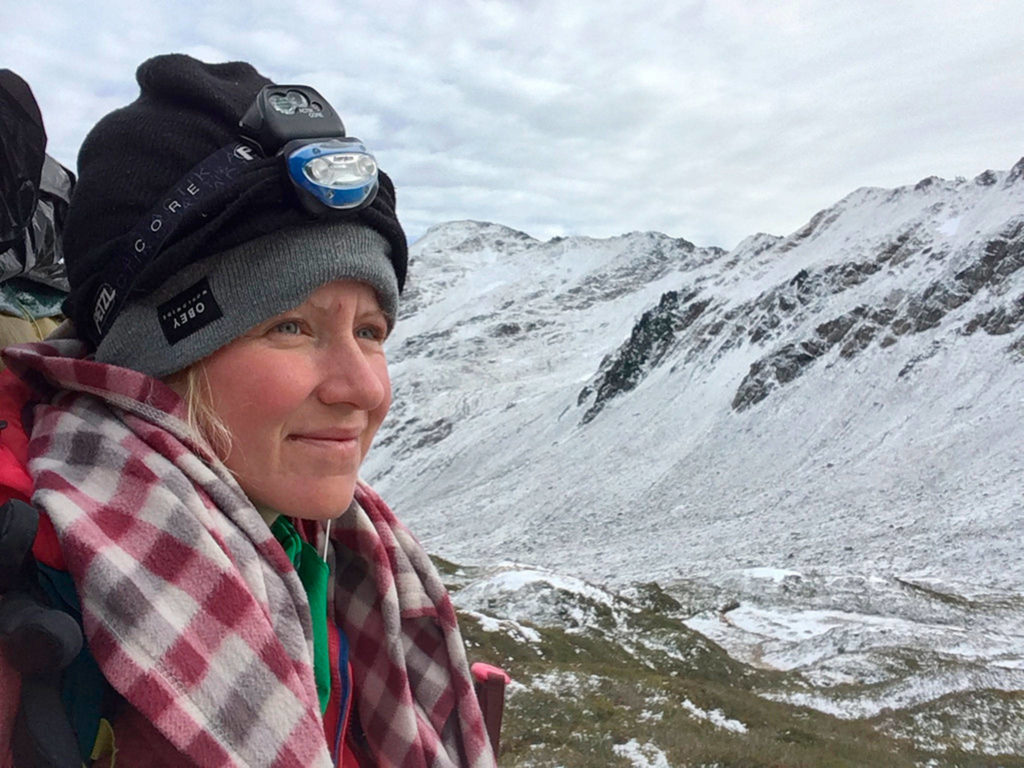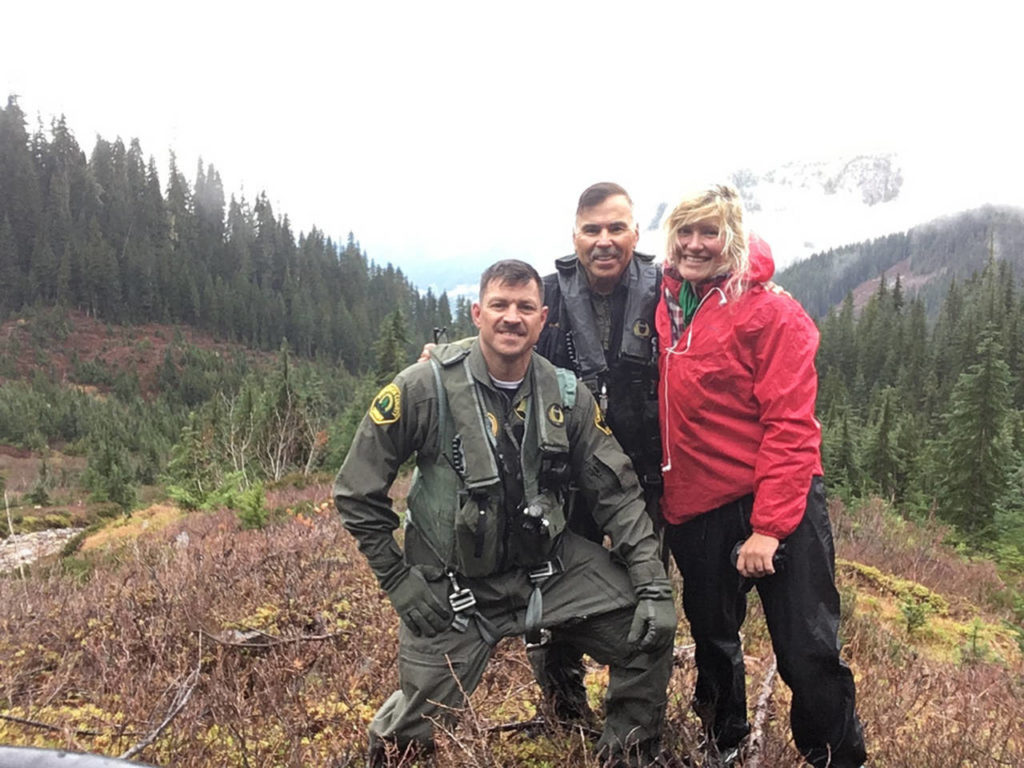SULTAN — If this was the end for Katharina Groene, she wanted her family in Germany to know she was sorry.
“I apologized for being so stupid, and that I risked so much,” she said.
Her messages could not get through. Cell service is nil at Mica Lake, a glacial pocket beneath 6,300-foot Fire Creek Pass.
Groene, 34, of Munich, had crossed 2,500 miles of dirt, rock and ice on the Pacific Crest Trail since May 9. She was within 120 miles of Canada when she awoke Sunday to a whiteout of heavy snow, deep in the Glacier Peak Wilderness. Her shoelaces were so frozen it took an hour to pry the eyelets open and force her feet in.
At times, Groene waded through waist-deep powder. Her toes turned purple under wet socks. She had no gaiters, no satellite beacon and virtually zero experience in the wilderness, other than the past five months, when she’d been using an app on her phone for a map. She assumed she’d die before she reached Stehekin. Or if she did make it, she might lose a foot or a leg to frostbite.
She ate snow and sang songs to herself, to make sure she could remember the words, as proof she wasn’t losing her mind from dehydration, hunger and cold. She screamed names of people she knew.
One name was Nancy Abell, a hiker she’d met a week earlier on the edge of Lake Susan Jane, south of Stevens Pass.
Abell, a Sultan local, had paused at the lake Oct. 22, to explain to a group of Arizona hikers why the fire they’d built two feet from the shore was illegal at high altitude in the Cascades, where so many dazzling, fragile places have been loved to death. In the middle of her lecture, Abell saw Groene bounding along the lake wearing a pink jacket and a 40-pound backpack.
Groene may have been the last northbound thru-hiker on the Pacific Crest Trail. Abell offered her a ride to a trail angel’s home in Baring. She tried to warn Groene not to finish, not this time of year in Washington, with bad weather moving in.
Abell couldn’t convince her. Groene hitchhiked to Leavenworth and set out again Oct. 24. As the forecast worsened, Abell alerted search and rescue Monday morning.
If not for the chance meeting, a Snohomish County sheriff’s helicopter team would not have known to go looking for the missing hiker. They would not have seen her footprints in the fresh powder around 2 p.m., and would not have spotted Groene wearing a green tarp and a pink jacket, beaten up by a blizzard, but alive.
City Girl
For northbound hikers, the Pacific Crest Trail begins on the Mexican border and ends at Manning Park in British Columbia. The popularity of the journey has exploded in recent years, as fuel for memoirs, documentaries and photo-heavy blog posts.
Hundreds of miles cross barren deserts in south California. A brutal stretch eclipses 10,000 feet in the Sierra Nevada. And almost all of the successful northbound hikers — scruffy, dirty, dog-tired — finish as winter approaches in the Cascades.
A decade ago, the PCT Association logged about 100 thru-hikes per year. This year the number had jumped above 800.
Groene, who is half-German and half-Russian, learned about the trail from Hollywood. She’d seen “the movie.”
Cheryl Strayed’s bestselling memoir, “Wild: From Lost to Found on the Pacific Crest Trail,” had been adapted into a Reese Witherspoon biopic in 2014. Since then, hordes of new hikers have been testing themselves.
Some, like Groene, were buying backpacking boots for the first time. Her only background as a hiker was footing it from hotel to hotel. It’s not exactly like going from mountain to mountain for 2,650 miles, with a hotel on your back.
She found herself with a wide open summer, before she had to begin her Russian studies at a university in Munich. So she flew to California in spring, loaded up on new German hiking gear.
A rite of passage on the PCT is to adopt a goofy trail name, like Fireball, Tumbleweed or Ramen Shaman — nicknames of alumni who crossed the finish line this year. Groene was dubbed City Girl, a name she picked up on another trip to Australia.
She lived up to it, she said. About a mile in, a backpack strap snapped. She got a replacement. After about another mile, it broke again. She made it work for a few million steps. Her shoes wore out early on, about 100 miles in. She was gifted a pair of Altra trail runners. She found herself running out of food, and would often go hungry on the last day before a pit stop. She learned to go heavy on calorie-rich butter.
Her pace was slow, with a pack weighing 40 pounds, which is heavy for a distance hiker. She figured the trail would help her lose weight. She was not in shape for grueling 30-mile days. She averaged about half of that.
The only way to make up for it, she said, was to wake up at 4 or 5 a.m. and hike until 11 p.m.
“This was my daytime routine,” she said, “for the desert and the whole Sierras.”
She watched people drop out around her, most for good reasons.
At night, she would shiver in a sleeping bag. Around the 700-mile mark, she met a hiker with the trail name Nobody, who fixed up the broken zipper of a better sleeping bag and gifted it to her. She hadn’t really slept in weeks.
“I don’t know how she survived,” she recalled Nobody saying. “She’s supposed to be dead.”
Side trip
Groene didn’t believe she could finish the trail until she hit the midpoint.
Around the same time, her visa was running out — a realization that hit her on the trail. She ran to the nearest road. She had about 30 hours to spare when she hitched rides on cheap buses from Redding to San Diego in August. She took a trolley the wrong way in San Diego, begged an Uber driver with a $20 bill to drive her to the border and crossed into Tijuana with literally two minutes to spare.
She’d read that she needed to leave the continent, before she could reenter the country and reapply for a visa. So she flew to Cuba.
On her return, U.S. Customs must have thought her recent travels seemed suspicious: Munich to Los Angeles to Tijuana to Cuba to Houston, en route to San Francisco? She was brought into a back room. Words spilled out like a waterfall, she said, when she tried to explain her travels in imperfect English. They asked where she was staying.
“I don’t have an address,” she said. “I live in the forest.”
Eventually she convinced them she was not high on a drug called PCT. She was let back into the country. But she’d lost three precious weeks of August, prime hiking season in the Pacific Northwest.
Her timing allowed her to skirt past the wildfires in north California. She slept in a bathroom rather than freeze near Crater Lake.
At camp, she would ask people to pray for her and for good weather.
“God doesn’t help you, if you don’t try to act a little bit,” she said.
For months, her prayers were answered. She hardly saw snow until Washington.
People die on the Pacific Crest Trail, from illness, slips, hypothermia and all the ways that nature tries to kill us. Many of the people rescued on the trail aren’t thru-hikers. Much of it is accessible to day trips.
Snohomish County is home to 87½ miles of the trail, in some of the most remote and unforgiving wilderness in the country.
Groene did not bring paper maps, in line with online advice of hikers who value a light pack over basic safety.
A company that makes one of these apps, Guthook, gives a warning in all caps on their blog: “ELECTRONIC DEVICES AND APPS CAN FAIL. IT IS A HORRIBLE IDEA TO RELY SOLELY ON A DEVICE OR AN APP AS YOUR SOLE NAVIGATION SOURCE.”
So when Abell met Groene last week, she felt nervous about her pressing on. She made a post on nwhikers.net about the German woman she’d gotten to know over a few hours together. Much of that time Abell spent trying to warn her new friend.
Groene figured she’d come too far to give up. She’d just survived a harrowing day of whiteout conditions, where she had to crawl across snow at a high, narrow point called the Knife’s Edge, at Goat Rocks southeast of Mount Rainier.
“I just saw black clouds around me,” she said. “You feel like you’re flying above the mountain.”
What could possibly be worse than that?
Getting out
Abell saw the forecast called for 2 to 3 feet of snow in the mountains. She came across a trip report for Lake Valhalla, north of Stevens Pass, on the Washington Trails Association website.
“Part way down the descent to the lake I met PCT through hiker ‘city girl’ from Munich, Germany on her way to Stehekin for her end point,” it read.
On the forum, Abell and others tried to triangulate where Groene would be, with a daily 15-mile pace stalled by bad weather.
“If she didn’t get started until Wednesday,” Abell wrote on Monday morning, “she might have only got as far as Mica Lake on Saturday, when the storm hit, one of the more inhospitable places on the PCT to be during a blizzard.”
[Watch a video of the news conference with Katharina Groene]
Abell once camped at Mica Lake in a snowstorm. She’d hunkered down for three days.
In the past, Groene has felt little faith in humanity. Today, she knows a stranger cared enough about her to call for help.
“You have always to take care of yourself, but also take care of the people around you,” Groene said. “That’s what Nancy did.”
Sheriff’s Sgt. John Adams phoned Stehekin and Holden, tiny towns along north Lake Chelan. No one had seen City Girl.
By then, Groene’s rations had dwindled to a 400-calorie pack of Pop-Tarts a day. At a particularly difficult point, she slogged through snow to cover 100 feet. To set up a tent guarded by two tarps, it took two hours, and another two hours to tear it all down, she said.
She lost two of her three pairs of gloves in the snow. She dropped her phone and retraced her steps for a mile on a ridge to find it.
On Monday morning, one of two tarps she’d been wearing as a kind of poncho blew away, down the mountainside. What seemed like bad luck ended up being incredibly good luck. In her poncho, she would’ve been a dark green speck, invisible from the air.
The helicopter launched under clouds and rain showers around 12:30 p.m., piloted by Bill Quistorf and Einar Espeland. The blizzard had passed. They spotted footprints on a ridge above Milk Creek, but no hiker.
And they were running out of fuel. On what was to be their last buzz over the tall trees, they saw a bright pink jacket. Groene was less than a mile from Mica Lake, on switchbacks just under the snow line, about 55 miles north of Stevens Pass.
Groene waved, thinking they were sightseers. Then the crew descended to the gentlest slope in the area and tried to land, without success. Espeland climbed out and stacked logs for the skids to rest on, at a tilt. It worked. Groene raced to him and burst into tears. She was in a daze from hypothermia and thirst. Espeland showed her a flier with a photo of her, taken by Abell.
Groene cried, “She did it!”
Caleb Hutton: 425-339-3454; chutton@heraldnet.com. Twitter: @snocaleb.
Talk to us
> Give us your news tips.
> Send us a letter to the editor.
> More Herald contact information.
